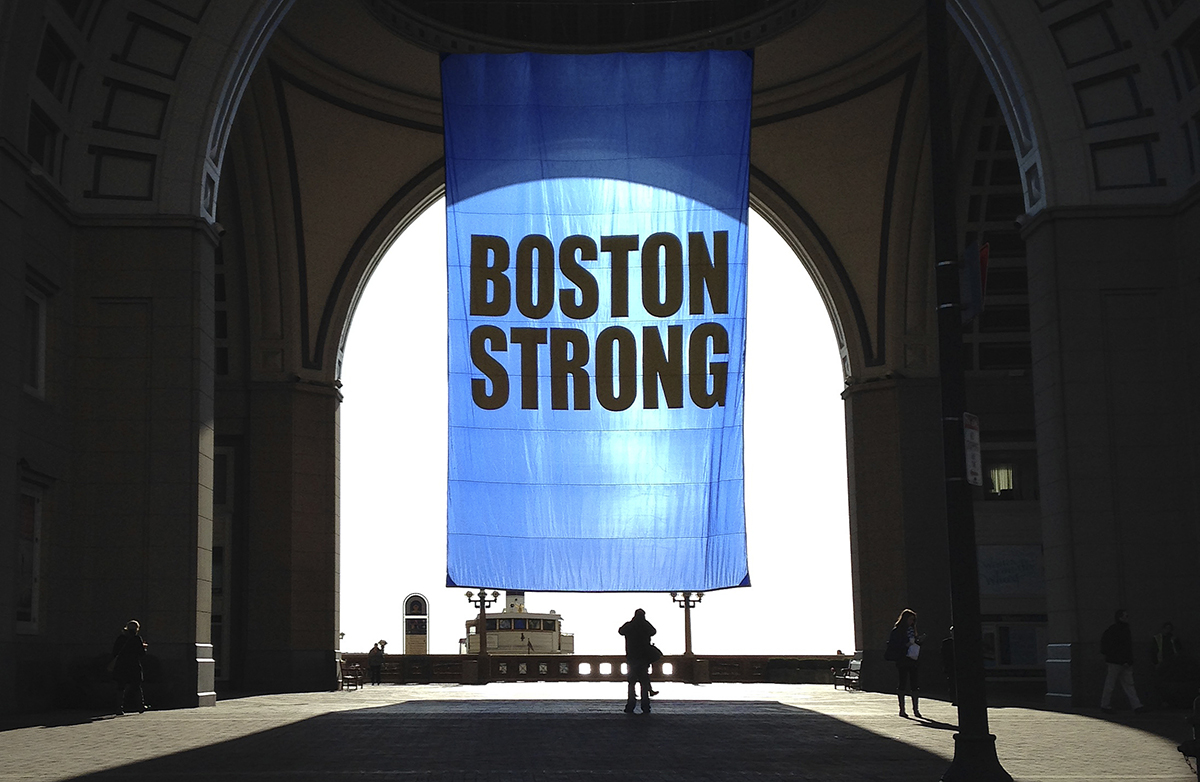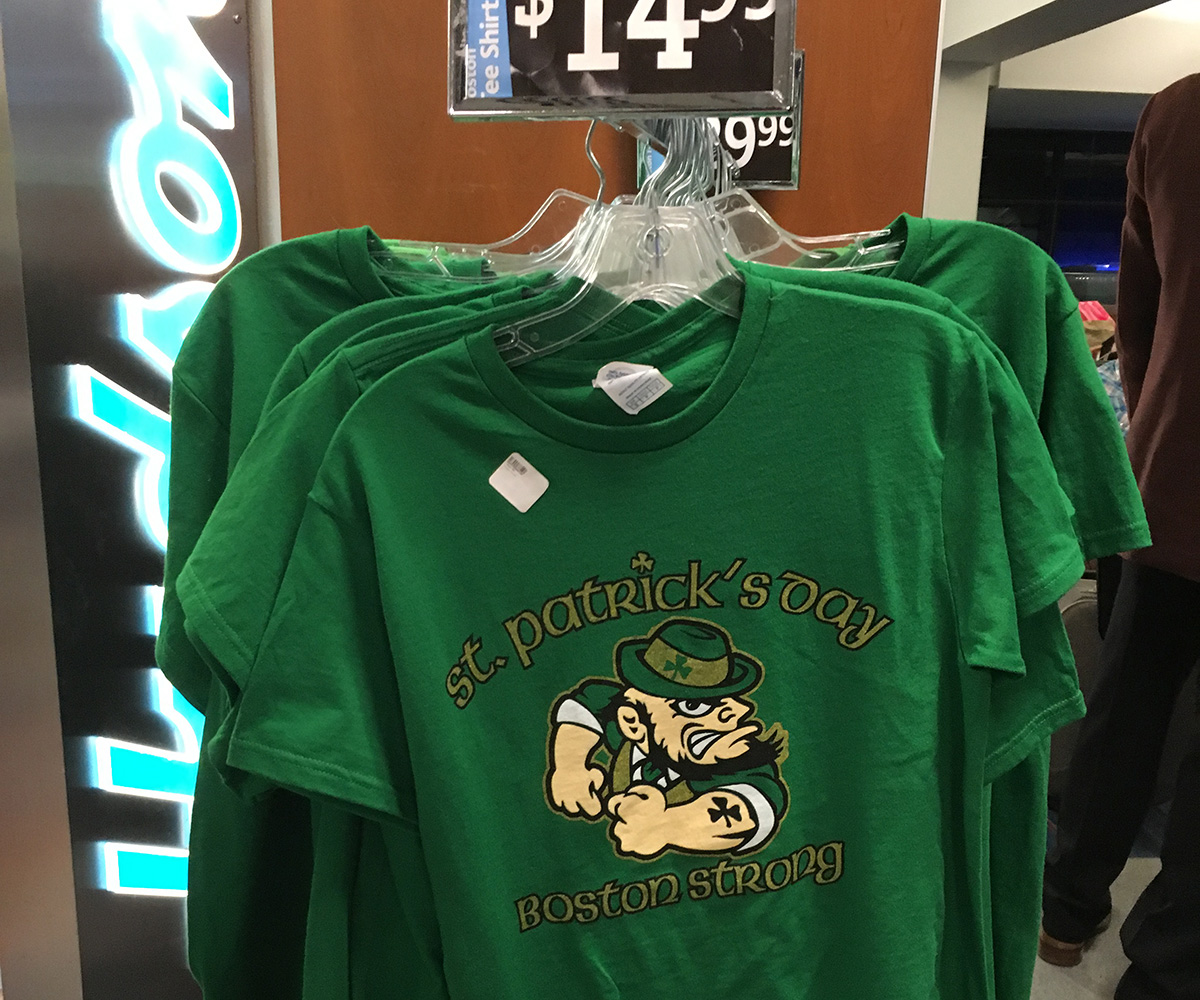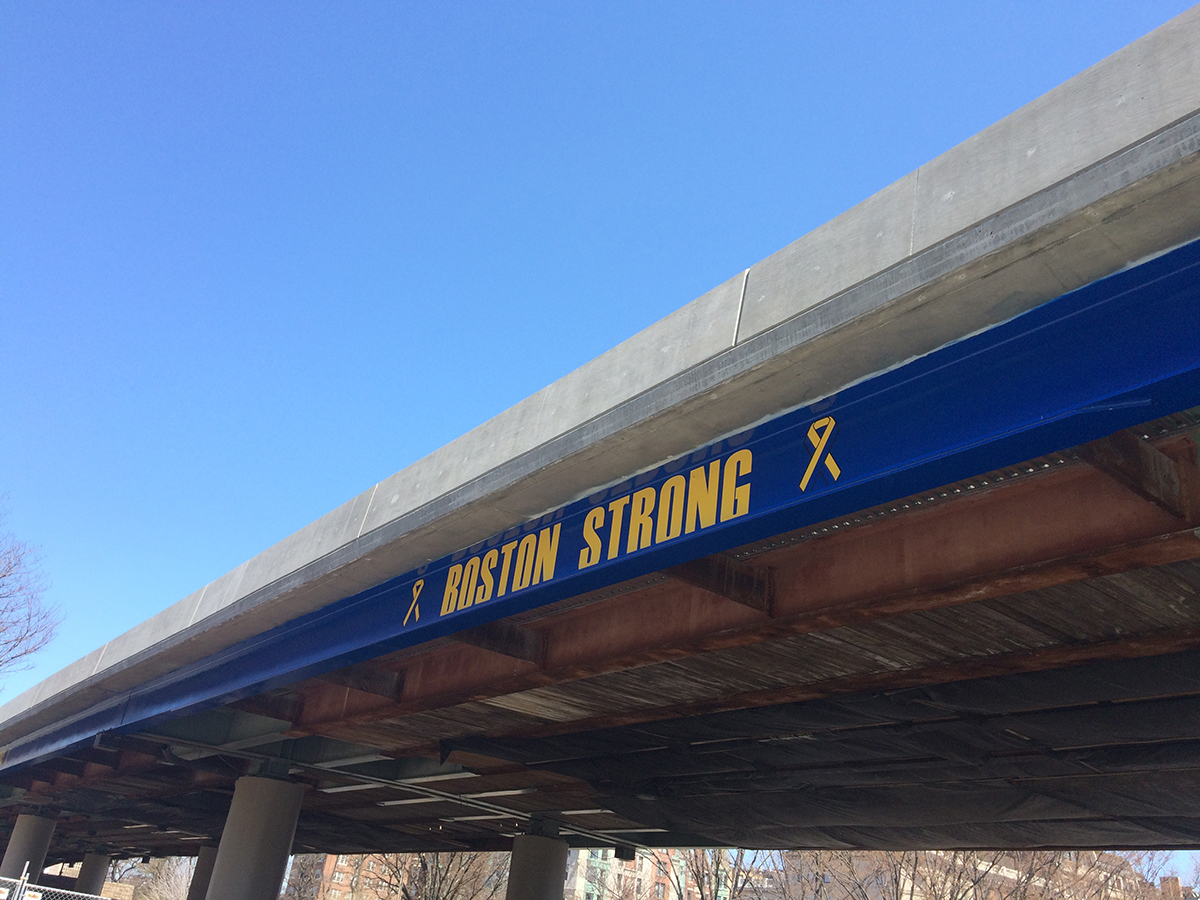Does ‘Boston Strong’ Mean Anything Anymore?

A ‘Boston Strong’ banner hangs near Rowes Wharf. / Photo via AP
On April 15, 2013, two pressure cooker bombs placed near the finish line of the Boston Marathon by brothers Tamerlan and Dzhokhar Tsarnaev detonated, killing three spectators and showering hundreds in white-hot shrapnel.
On April 17, two applications were filed with the U.S. Patent and Trademark Office for the phrase “Boston Strong,” for use on clothing and accessories, by Kerim Senkal of Allston, and Born Into It of Woburn, better known as Chowdaheadz, purveyor of all sorts of New England merchandise emblazoned with shamrocks and Citgo sign mockups.
“I’m just a regular blue collar guy trying to make a quick buck,” a candid Senkal told the Daily Mail at the time. Both trademark applications were abandoned by the following January.
Quite a bit has changed in the three intervening years. Boston has a new mayor, and Massachusetts, a new governor. The Red Sox haven’t sniffed competence since Jonny Gomes placed the World Series trophy at the finish line on Boylston Street. The One Fund, set up to aid survivors and their families in their recovery, announced it would begin dissolution after distributing millions to those hardest hit by the tragedy. Dzhokhar Tsarnaev was found guilty in federal court and sentenced to death following months of grueling testimony from those who lost limbs and loved ones to the blasts.
Meanwhile, what has become of our rallying cry through all the unspeakable horror? Has “Boston Strong” been commercialized? This question, posed with some regularity, has become relevant once again with Mark Walhberg and Jake Gyllenhaal‘s upcoming films about the marathon bombings. Is it possible that “Boston Strong” was inherently marketable, and hence why it stuck so prodigiously? And better yet—does any of that matter?
The phrase “Boston Strong” was virtually nonexistent on the internet prior to spring 2013, and Google Trends shows a spike in search traffic related to it each April since. Three of the top five search terms in this time were related to T-shirts—and for good reason. Just two hours after the blasts, Emerson College students Chris Dobens and Nick Reynolds created the now iconic blue and yellow “Boston Strong” shirts, which raised more than $1 million for the One Fund.
“We were sitting there kind of stunned. Not necessarily sad, because you don’t process everything until hours or days later. But we knew we had to do something,” Dobens says. “So we started thinking of these messages of solidarity—what could get people to come together and help each other and support each other? And so I started saying this phrase, ‘Stay strong, Boston strong,’ in kind of the same light as ‘Army Strong’ and ‘Country Strong,’ because they have such huge followings and huge communities. … We ended up shortening it to “Boston Strong” because it was short, sweet, to the point, and it really conveyed the message we were trying to make.”
Dobens, who will graduate from Emerson in just three weeks, still has a dozen or so “Boston Strong” shirts laying around his home, which he gives to friends who have fallen on hard times as “something to hold on to and know that they’re appreciated.” He and Reynolds briefly considered trademarking the phrase, but decided against it. The optics, Dobens says, would have run contrary to their mission.
“The reason why we didn’t was because if we trademarked it, there would be this perception of, ‘Oh, they’re trying to make some money off of it,’ which is a really hard perception to fight,” he says. “So we kept it very public, because if people saw that we were not in this for the money, then we’d be more successful. And we still live by that to this day. Neither one of us have ever profited off those shirts.”

Spotted in Logan Airport. / Photo by Kyle Clauss
Others did not share Dobens and Reynolds’ Jonas Salk-like approach. The day after the citywide manhunt for Dzhokhar Tsarnaev kept thousands of Bostonians in their homes, three different men in Brockton; Oxford, Connecticut; and New Port Richey, Florida, applied for trademarks on “Boston Strong.” Two days later, Jim Koch’s Boston Beer Company applied for a “Boston Strong” beer trademark. Two coffee companies, Meahuna Coffee of Tewksbury and the New England Coffee Company, filed similar applications for their wares in the following weeks.
“It was before my time at the company, so unfortunately I do not have details on what the previous team had hoped to do with the trademark,” New England Coffee brand manager Melissa Gilreath said in an email. Like Chowdaheadz and Senkal’s, these applications were all abandoned in 2014.
Even without a registered trademark, repeated use seems to have catapulted “Boston Strong” into the same stratum of bumper sticker truisms as “Yankees Suck!” The phenomenon is not unlike the process by which maraschino cherries are mass-produced. Natural, plump Royal Ann cherries are bleached with a solution of sulfur dioxide and calcium chloride, then soaked in dyes, flavorings and preservatives and passed along to the consumer. What started as something organic, from the gut of every Bostonian who can fog a mirror, has been processed and stripped of its authenticity.

This year, Boston Marathon runners will be welcomed into the home stretch by this ‘Boston Strong’ sign painted on the Bowker Overpass. / Photo by Carly Metz
It’s entirely possible there are two Boston Strongs.
There’s the chest-thumping slogan emblazoned on tourist-bait for sale beside unofficial Harvard sweatshirts at kiosks scattered across Logan Airport and Faneuil Hall, analogous to “I Love New York” shirts.
Then there’s the sublime solidarity that was on display throughout the week of the bombings: at candlelight vigils across the city that saw non-believers stand arm-in-arm with the devout; in the misty-eyed glances shared between Green Line passengers as their train glided through a darkened Copley station; and in the crowds of thousands that gathered in the Common the night police captured Tsarnaev in Watertown.
“‘Boston Strong’ is our city’s resilience and spirit that carries us forward in good times and bad,” says Mayor Marty Walsh. “‘Boston Strong’ embodies our love for our city and its people, and what makes Boston the greatest city in the world.”
The phrase was never about our collective machismo or sports prowess. It was about how we persevered when we were hurting most—when we shook off our New England chill and cared for one another.
“Boston Strong, to me, is much more than that T-shirt and just the simple phrasing. It’s been a lifestyle for me, helping people and being there for others in a variety of different ways, in my personal life and even in the community,” Dobens says. “Having had that experience, and being able to start a movement like that, it’s just changed my life. It’s made me a much more positive person. It gives me hope in humanity, that others are there to help each other. It’s just a really positive message that I hold very close to my heart.”

Runners and spectators pose at the Boston Marathon finish line in 2015. / Photo by Olga Khvan


